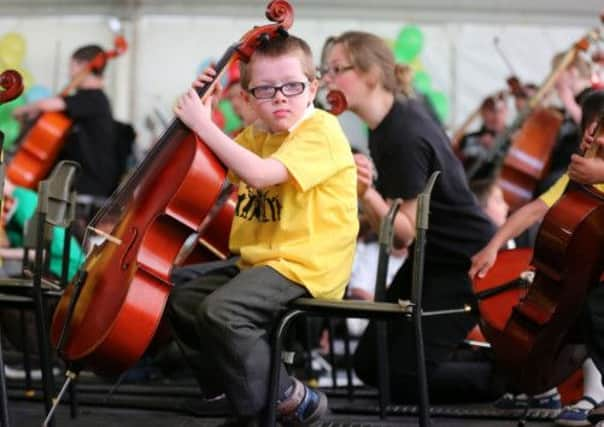Action needed to raise kids out of poverty


POVERTY is one of the greatest challenges the world faces. It exists in poor and rich countries alike, as Scotland knows only too well.
While extreme poverty is generally confined to the developing world, closer to home there are also plenty of people struggling. Measured in terms of income, a household earning less than 60 per cent of the UK median household income is considered to be in poverty.
Advertisement
Hide AdAdvertisement
Hide AdOfficial Scottish Government figures show that one in seven people in Scotland lives in relative poverty, which brings with it all the attendant consequences including poor health, low educational attainment and an inability to use existing opportunities to mitigate, or even exit, the cycle of deprivation.
A study by the World Bank, “The State of the Poor: Where are the Poor and Where are the Poorest?” shows the number of people in extreme poverty has fallen from half of the global population in 1981 to around 20 per cent in 2010.
However, when you exclude China from this, the global picture is quite different, and between 1990 and 2008, the number of people living on less than $1.25 (80p)a day fell only from 1.23 billion to 1.12 billion. When you look at the numbers living on less than $2 (£1.26) a day, the figure has actually risen – from 1.53 billion to 1.82 billion.
Given the amount of official aid that has been spent over the years, why are so many people still living in such chronic extreme poverty?
The bulk of economic research and poverty reduction activity focuses on improving things like job creation, social benefits, the availability of credit and tackling insecure property rights. All of these things are what economists call “external constraints” – things that are hard for individuals to control themselves.
Easing these external constraints is important, but largely missing from conventional analyses of poverty traps, however, are the psychological mechanisms through which the experience of poverty, whether in Scotland or in India, serves to form the beliefs, values, and aspirations of the poor.
Many researchers have highlighted that learned helplessness, a pessimistic outlook and a belief that external factors have control over you, can perpetuate poverty.
Unlike external constraints, these “internal constraints” come from within an individual because they adapt to the experience of chronic poverty. Over time they become an independent source of disadvantage for poor persons in their own right and imply that the poor are unable to fully participate in society.
Advertisement
Hide AdAdvertisement
Hide AdWe can see aspirations failure in a person who does not try to escape poverty, even although poverty can be escapable with additional effort that is within their means.
Often, individuals underestimate how their aspirations may evolve over their lifetime as a consequence of their own efforts.
How to change such attitudes? In Kolkata, the Durbar Foundation is seeking to empower a marginalised and stigmatised community of female sex workers through what are known as “dream-building” sessions.
With my co-investigators, Anandi Mani and Sanchari Roy (Warwick University), and Sandip Mitra and Dr Jana (based in Kolkata), I undertook a small-scale pilot study of the project.
A sample of 34 sex workers was randomly selected and interviewed for the study; for comparison, eight other sex workers who had not been exposed to the workshops were also interviewed. The interviews focused on outcomes related to behavioural and psychological measures, such as opinion about oneself, sense of shame arising from sex work as a profession, feelings of discrimination, locus of control, decision-making, and mobility.
It was found that the dream-building workshops improved the women’s sense of self-worth – they were less likely by one third to think of themselves as fallen women or sinners, and significantly less likely to feel ashamed of their occupation.
Following exposure to the workshops, these women were also significantly more likely to feel discriminated against, which might be reflective of their heightened sense of self-worth.
In Scotland, a different but related project is having a similar effect with a different group of people – namely school kids in areas of Stirling and Glasgow with high poverty rates.
Advertisement
Hide AdAdvertisement
Hide AdSistema Scotland has created the Big Noise orchestra, an initiative pioneered in Venezuela, which isn’t so much about the music as giving young people the aspirations and confidence that will help equip them with the self-belief they need to escape from poverty.
A report commissioned by the Scottish Government into the scheme reported “evidence that Big Noise is having a positive impact on children’s personal and social development, including increased confidence, self-esteem, sense of achievement and pride, improved social skills and expanded social networks”.
It is exactly these kinds of personal and psychological development factors that can play a crucial role in perpetuating or escaping from poverty traps. It’s not only the external factors that hold us back from achieving great things, but our own self-doubt and negative beliefs.
Pro-poor policies that take into account the need to alter internal constraints will have a greater impact on poverty alleviation than policies that address external constraints alone.
• Professor Sayantan Ghosal is professor of economics, Adam Smith Business School, University of Glasgow www.gla.ac.uk/schools/business